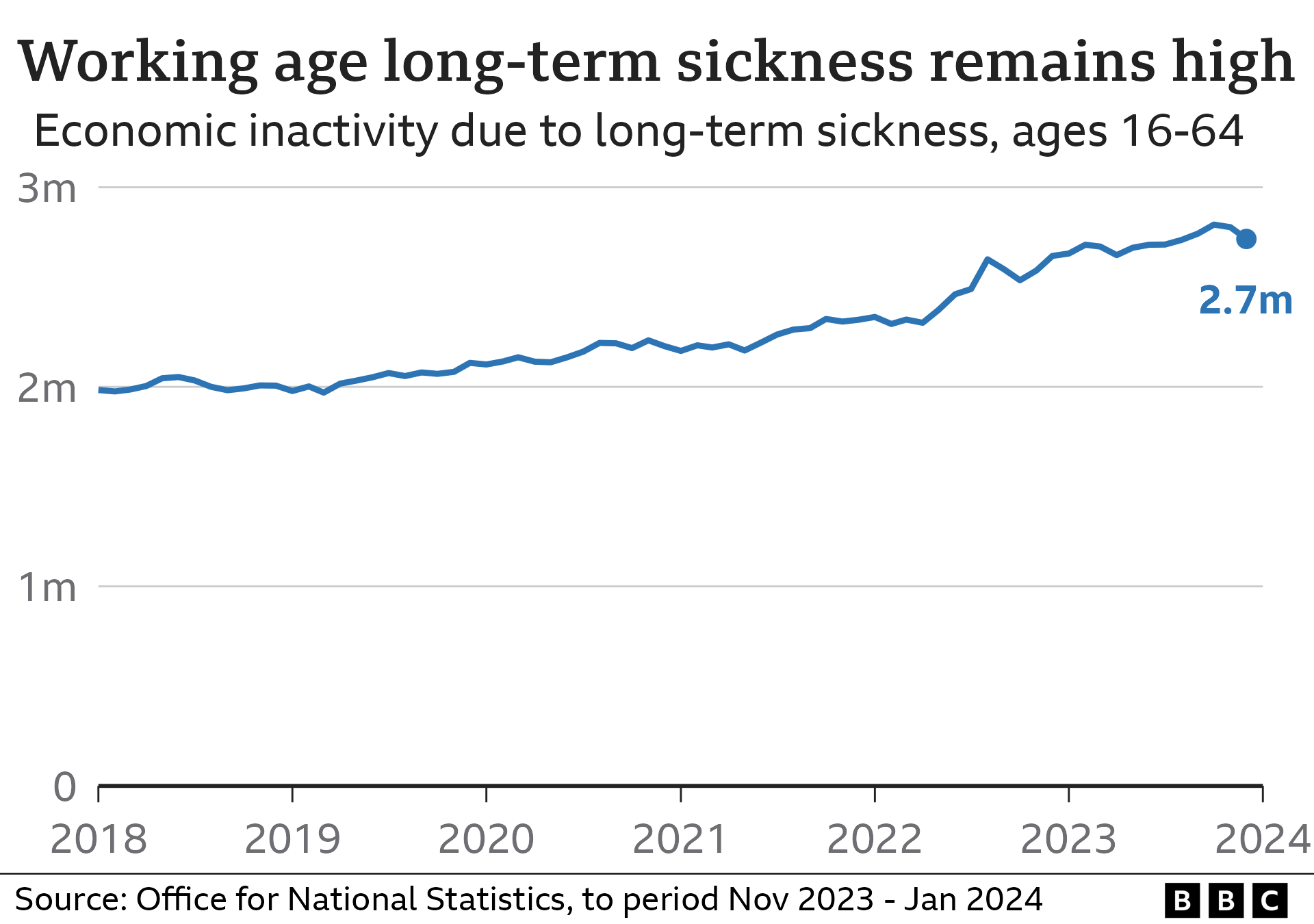More than a fifth of UK adults not looking for work
- Published
- comments

More than a fifth of working-age adults in the UK are deemed not to be actively looking for work, figures suggest.
The UK's economic inactivity rate was 21.8% between November and January, marginally higher than a year earlier.
It means 9.2 million people aged between 16 and 64 in the UK are not in work nor looking for a job. The total figure is more than 700,000 higher than before the coronavirus pandemic.
Concerns have been raised over worker shortages affecting the UK economy.
The health of the UK economy is in the spotlight with the general election set to be called in the coming months and both major political parties pledging to boost growth.
The UK fell into recession at the end of last year when the economy shrank for two consecutive three-month periods, but latest official statistics showed the level of unemployment remained steady. The figure also showed that wage rises slowed again, although pay is still outpacing inflation.
However, the number of people not employed or actively looking for work has remained at a persistently high level in recent years since it first surged during the pandemic.
Long-term illness has been cited as the main reason for about a third of the working-age inactive population not being in the labour force.
But other groups placed in the bracket - defined differently to unemployment - by the Office for National Statistics (ONS) include students, people who look after family or a home, people with disabilities, and early retired and discouraged workers.
More women still tend to be classed as economically inactive compared to men, but the gap has narrowed since records began in the early 1970s, largely due to more women entering the workforce.
The ONS said its latest figures suggested the number of people inactive due to being sick fell in recent months, but remained higher than estimates a year ago.
It added there had been an increase in people aged 16 to 34 becoming economically inactive, but that the number aged 35 to 64 had fallen. A recent report suggested people in their early 20s were more likely to be not working due to ill health than those in their early 40s, with cases of poor mental health believed to be on the rise.

Workforce shortages have led to Chancellor Jeremy Hunt setting out a series of measures, most recently in his Budget last week, aimed at encouraging people to find work, or increase hours.
Policies outlined include reducing the starting rate for National Insurance Contributions from 10% to 8% for 27 million workers from 6 April, along with an extension of free childcare services for working parents.
But business groups said more needed to be done to get more people into work amid concerns over the UK's long-term weak economic growth.
Neil Carberry, chief executive of the Recruitment and Employment Confederation, added that cutting NI rates was the "right call", but would not be a "silver bullet to encourage enough people to work".
"To get inactivity down government needs to look at childcare, transport and address NHS waiting lists," he said. "The Budget didn't add up to the industrial and workforce strategy we really need despite the chancellor's obvious interest in workforce matters."
Alexandra Hall-Chen, principal policy adviser for employment at the Institute of Directors, said many companies were "still struggling to access the skills they need".
"A future government should place tackling skills shortages and increasing labour force participation at the centre of its growth plan," she added.
'Disconnect between employers and young people'
Chris Bingham, chief executive of energy supplier Greenarc Ltd in West Yorkshire, said businesses need to think about how to encourage people into the workforce, and "give them more of what they want", especially to younger employees.
He said that people aged 16 to 24 had their education disrupted by the pandemic. "They're coming into a workforce and business community that itself is still struggling to understand how we're all going to work post-Covid," he told the BBC's Today programme.
"I think there's a clear disconnect between the employer and young employees," he added, arguing that any future government needed to put a "bigger focus on apprenticeships and workplace engagement as opposed to a blanket university route".
Work and Pensions Secretary Mel Stride told the BBC that the UK had a "very healthy" labour market and that the government's "plan is very much baring down on economic inactivity", adding that the UK had a lower inactivity rate than the US, France and Italy,
The government's official forecaster, the Office for Budget Responsibility (OBR), which has estimated that policies on childcare expansion, welfare reform, and personal tax cuts are predicted to increase the UK's labour supply by more than 300,000., external
But the OBR has said that personal tax thresholds being frozen "will also weigh on work incentives", meaning the increase would be closer to 200,000.
Richard Hughes, chair of the OBR, told a committee of MPs on Tuesday that people being out of the workforce for health reasons "is now the single largest reason", and added it was "worrying" for economy.
"If they're not working, they're not paying tax, and they're also more likely to be on benefits," he said.
Liz Kendall, Labour's shadow work and pensions secretary, said millions of people were "locked out of work" due to long-term sickness on the "Tories' watch".
She said Labour would cut NHS waiting lists as part of a plan to get more people working.
As well as the economic activity figures, the ONS also revealed:
The unemployment rate remained steady at 3.9% in the three months from November to January, which was marginally higher than economists had forecast
Growth in regular pay, which excludes bonuses, slowed again, but at 6.1% is still outpacing inflation, the rate prices rise at, by 2%
There were 203,000 working days lost because of strike action across the UK in January 2024
Job vacancies from December to February 2024 were down by 224,000 from the previous year but they remained 107,000 above pre-Covid levels.
The ONS has issued warnings over the reliability of its jobs market data, with the survey upon which its results are based on having a smaller number of respondents than has historically been the case.
Questions over the data on the jobs market raise issues for the Bank of England, which uses the ONS's releases to gauge the health of the UK economy.

How to get a job: Expert tips for finding work
Search beyond a 40 mile radius
Use key words in your searches
Don't wait for a job to be advertised
Sell your skills not your years
Read more here.



Are you among the number of people not actively looking for work? Tell us your reasons by emailing: haveyoursay@bbc.co.uk, external.
Please include a contact number if you are willing to speak to a BBC journalist. You can also get in touch in the following ways:
WhatsApp: +44 7756 165803, external
Tweet: @BBC_HaveYourSay, external
Or fill out the form below
Please read our terms & conditions and privacy policy
If you are reading this page and can't see the form you will need to visit the mobile version of the BBC website to submit your question or comment or you can email us at HaveYourSay@bbc.co.uk, external. Please include your name, age and location with any submission.

- Published16 April 2024

- Published12 February 2024

